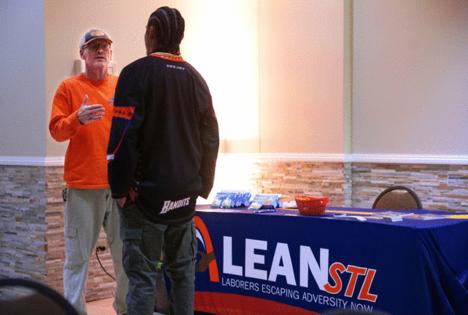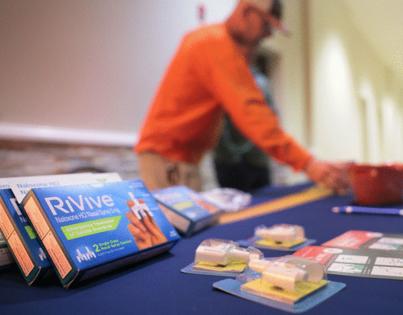In St. Louis, unions join forces to tackle 'shocking' rates of suicide for workers
Published in Business News
ST. LOUIS — Among the 16 building trades in the St. Louis area, a network is forming to focus on the mental health of workers.
The increasingly critical effort aims to draw out a group with a reputation for being tough as nails — and tight-lipped about personal problems.
The motivation to join forces can be found in statistics. Construction workers have the second-highest suicide rate of any industry, behind mining. Substance abuse is twice as common as it is among the general U.S. population, and overdose deaths occur 18 times more often than job-site fatalities. Almost everyone with experience in the industry has lost a friend or coworker.
Dave Scott, with the International Union of Elevator Constructors Local 3, had a buddy die by suicide 13 years ago.
“Not knowing how to help somebody is a hard thing,” he said.
Over the past decade, national organizations, including the federal Occupational Safety and Health Administration and a nonprofit called the Construction Industry Alliance for Suicide Prevention, have funded research and shared resources to help with mental health and addiction among builders.
In the St. Louis area, piecemeal efforts have been underway among the 35,000 members of the building trades, from partnering with universities and publishing studies to holding seminars and giving away gun locks. Now, the unions are teaming up to establish their own nonprofit: the St. Louis Building Trades Wellness Coalition.
“We’ve been getting all these people in a room who are doing something,” said Scott, Local 3’s business representative. “Many hands make light work.”
Construction workers face unique circumstances that put them at higher risk of self-harm, experts say. The industry is about 90% male, and men are more likely than women to experience addiction and to die by suicide. The career is physically demanding; on-the-job injuries can sometimes be a first step toward the overuse of painkillers.
Schedules are stressful and unpredictable, with tight deadlines fueling long days and weeks — which are often followed by stretches of unemployment.
“You’re always working yourself out of a job,” said Scott.
Then there’s the culture, which he described as “machismo” — a reluctance to appear weak that precludes builders from reaching out even if they are spiraling.
But in recent years, mental health struggles have become less taboo across society. That relative openness has spread to the trades.
“You get a lot of people who are still, ‘I can do it on my own,’ ” said Ryan Teal, a Local 3 member who volunteers with a peer-support hotline. “But even these people, once you break the ice, they have a softer side.”
In December, Teal got a desperate call from a fellow union member. The next day, he drove the man to the same rehabilitation facility in Raymond, Illinois, that Teal had found success with three years earlier.
Now, “he’s on a better road,” Teal said.
Coming together
St. Louis is on the vanguard in addressing the crisis in construction, according to Dr. Brad Evanoff, a researcher at Washington University who specializes in occupational injuries.
Evanoff had been working with labor leaders for 25 years, targeting hazards such as falls and carpal-tunnel syndrome. As data was released on the prevalence of self-harm, his focus shifted.
“I never thought I’d be working on suicide prevention,” said Evanoff. “But the statistics are pretty shocking.”
In 2022, just under 1,000 construction workers in the U.S. died in job-related accidents, according to the Centers for Disease Control and Prevention. That same year, about 5,200 killed themselves, and more than 17,000 died from an overdose.
Evanoff and local labor leaders point to John Gaal and Don Willey as the ignition behind the mental health movement. In 2016, Willey, then the business manager of Laborers Local 110, lost a son to an opioid overdose. The following year, Gaal’s son died by suicide.
“That was the first time I grasped the meaning of stigma,” said Gaal, who was a training director with the Carpenters Regional Council at the time.
Gaal and Willey worked through their grief together. They began educating themselves on addiction, suicide and emotional well-being. The magnitude of the crisis would require partnerships, they realized.
“We wanted to look at some models that were working,” Gaal said.
Over the next few years, he and Willey would undergo training, visit unions in other cities and connect with health care providers, professors and business contacts.
Wheels were turning elsewhere as well. The Missouri Works Initiative, a nonprofit sponsored by the state AFL-CIO, established the Worker Wellness Program in 2021. Gaal, who had retired from the carpenters council, was brought on as its director.
This year, Gaal and the Wellness Coalition, the new union-formed nonprofit, put together a series of seminars. They recruited experts and people with personal stories to share. Hosting duties were spread among the union halls. The topics ranged from support for survivors following a suicide to gambling addiction.
A second series, “Building Resilience: Mental Health in the Trades,” is already planned for 2026.
Peer support
For decades, James Pursell used alcohol to cope with depression and anxiety. Then, almost 10 years ago, with the help of his fellow workers in Laborers Local 110, Pursell began his recovery.
It changed his life, and it has given his career a new purpose.
Willey, the Local 110 business manager, learned about a peer-support hotline during a trip to Boston, and he shared the idea with Pursell.
Pursell enrolled in social work classes. He and Aaron Walsh, from Laborers Local 42, opened the LEAN-STL hotline — for Laborers Escaping Addiction Now — in March 2023.
Construction trade wellness orgs unify, activate to meet needs within industry
Opioid overdose nasal emergency kits are displayed at James Pursell's booth on Wednesday, Nov. 12, 2025, before a meeting of the Laborers Local 110 union. Pursell co-leads the Lean-STL (Laborers Escaping Addiction Now) hotline for workers.
The hotline is meant for members of Locals 110 and 42, which generally cover St. Louis city and county and the Metro East. But unofficially, Pursell and Walsh will talk to anyone who reaches out. They have received calls from as far away as Chicago, calls from labor union family members and calls from folks in other trades.
Pursell and Walsh work like air traffic controllers. They are not counselors, but sometimes the callers just want a listening ear. Other times, they need immediate help or a connection to professional support.
“Peers can do in five minutes what clinicians can’t do in five weeks,” said Pursell.
In the hotline’s first two years, the men fielded almost 8,000 calls, texts and emails — any hour, any day. It’s their full-time job, with their salaries paid by their locals.
Pursell credits LEAN-STL’s effectiveness to the “bottom-up” approach. People who use the hotline are talking to someone who has been in a similar position, who understands the job and its stressors. There is no power differential or risk of losing face.
“No one wants to go to their boss and seem like a mess,” Pursell said.
Local 3 of the elevator constructors has followed LEAN-STL’s path with its own peer-support line, operated by volunteers. Scott, the business representative, introduced Mike Jasper to Pursell and Walsh last fall.
Jasper, who has been in recovery for about three years, became a certified peer specialist along with six other men from Local 3.
“The team is very alike but with all different experiences,” said Jasper. “It’s like a Skittles pack.”
At first, he wasn’t sure what to expect. He found that he didn’t have to solve anyone’s problems. He didn’t need all the answers. He only needed to be open.
“I’m just a buddy to find resources,” Jasper said. “We’re unconditional. We’re there for the first call, we’re here for the second call — we’re here all the time.”
The spread of the hotlines from one union to another is an example of what the Wellness Coalition can do, its leaders said. Instead of labor groups remaining in silos, they can share information, collaborate on programs and remove barriers for workers who need help. The coalition’s seven executive board members have been meeting monthly since July and expect to have nonprofit status by early next year.
“The trades are very tribal,” said Gaal, one of the coalition’s board members. “We needed to get as many of them as possible to discuss what’s going on and hopefully overcome some of these issues.”
©2025 STLtoday.com. Distributed by Tribune Content Agency, LLC.















Comments